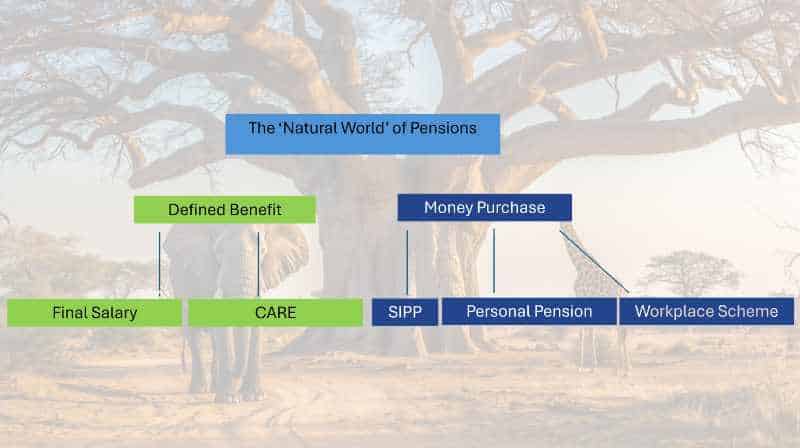
One question I’m regularly asked by new and prospective clients is how pension charges work. Despite the Financial Conduct Authority trying to make pension charging more transparent, it appears that there is still much confusion amongst the public.
Continue reading if you would like to understand how and what you are paying in pension fees (and if it is possibly too much).
There are three different fees you will be paying, plus a fourth depending upon who is investing the money on your behalf. I’ll deal with the three main ones first…
1 – Administration Fees
A company will be administering the pension on your behalf. It might be a traditional Life company such as Aviva, Prudential, or Legal and General. It might be a company that has bought the book of pension business from a life company. Examples would be Phoenix (who have bought Standard Life’s pension book as well as many other former pension providers) or Utmost (who have acquired Equitable Life’s pension business).
Alternatively, it might be a platform that provides pension and investment products in one place; Transact, Nucleus, Parmenion, and FundsNetwork are all examples. If you haven’t heard of them it’s not unexpected, they tend to be marketed via financial advisers and planners rather than directly to the public.
If you are a member of your workplace pension it might be that your pension provider was set up to provide company pensions when auto-enrolment came into force. If your pension is with companies such as Now or The People’s Pension, this is the type of pension you have.
If you have the time, inclination, and ability to invest the pension fund yourself there are direct to consumer companies that provide the administration and access to investment options but leave you to choose how to do it. The most well-known example is Hargreaves Lansdown.
An administrator doesn’t make any active decisions about what to do with your pension on your behalf, they simply act on instructions and make sure the pension fund is run according to the rules and regulations. They will take contributions from you, pay income out, buy investment funds according to your instruction, and request basic rate tax relief from HMRC. They will also ensure the funds are paid to the appropriate person on the death of the plan holder.
2 – Portfolio Management Costs
The second charge that will be taken from your pension is the cost of the investment portfolio. You will have made a decision on how you want your pension fund to be invested in the global investment markets and, most likely, you are invested in different funds.
These funds are run by asset management companies who make investment decisions on your behalf. There are different investment styles which, for reasons of brevity, I won’t go into here but suffice to say that these investment managers take a charge for the service they provide. You are paying them directly from the funds by way of an annual management charge plus transaction fees every time a fund holding is bought or sold.
3 – Advice Costs
The first two costs are definitely being taken from your fund. A third cost that may be taken is financial advice charges.
If you have engaged with a financial adviser or planner like myself it is probable that their fees are being taken from the pension fund too. It may be that you are part of your company’s pension scheme and there is an adviser for the company who is being paid from the funds of all members of the scheme.
A financial adviser should be working with you to make sure your pension (and any other assets you have) are appropriate to your life plans and priorities. They might be recommending alternative funds, changes to your contributions, or advising whether your pension fund is likely to breach the maximum lifetime allowance (LTA).
A really important point to make, and for you to check, is that, if you have previously engaged the services of a financial adviser but don’t see them or receive any ongoing services they might still be receiving advice fees from you. If this is the case you can ask your pension administrator to turn them off.
Bundled or Unbundled Charges
Depending upon the type of pension you have some or all of these charges may be bundled together as one charge. This is typically the case for pensions with the life companies mentioned above or workplace pensions. There is nothing wrong with this per se, it is just something to be aware of.
If your pension fund is on a platform the charges will be more transparent and unbundled. That is, you will be able to see exactly what you are paying for the cost of administration and portfolio management.
Since commission payments to financial advisers were banned the cost of advice should be stated separately too.
The Fourth Charge – Discretionary Fund Management
The additional charge that you might be paying is for a discretionary fund manager to make portfolio decisions on your behalf. They will buy and sell funds or individual company shares within pre-agreed risk tolerances and with specific objectives.
Discretionary Fund Managers would include the traditional stockbrokers; Quilters, Brewin Dolphin, Charles Stanley, and smaller more niche firms.
If you have a SIPP or platform-based pension it is possible that this is the case but you won’t be receiving these services unless you have been advised or agreed to it.
All In One Services
There are some companies that administer their own pension products, provide their own investment portfolios, and provide advice too. The most well-known example is St James’ Place who is a firm of restricted advisers, meaning their salesmen and saleswomen can only recommend products produced and administered by St James’ Place.
What Should You Be Paying?
You can’t escape paying some fees because there are services that you require and can’t do yourself. However, the more you pay in fees the harder your pension fund has to work to grow to a level that will provide you with enough capital to fund your retirement.
There will always be administration charges and the costs of investing the pension pot into funds. A combined cost of 0.5% -0.6% pa is reasonable. If you are paying more than 0.7% pa for both that is starting to become expensive and anything above 1% you really need to start questioning the value you are getting.
If you include the cost of advice, depending upon the size of your fund, the total charge could be in the range of 1.5% – 1.7%. For large funds, advisers may either charge a fixed fee or reduce the total percentage you pay.
I have seen and heard of occasions where the total costs have been more than 2% sometimes up to 3% which, in my view is daylight robbery.
Cost vs Value
As with anything you pay for you need to be sure you are getting value for the charges you are paying.
Oscar Wilde defined a cynic as someone who knows the cost of everything but the value of nothing. By looking for the cheapest you might end up paying more in reparations but equally, when things are commoditised there is no point paying more than you have to. Pension administration has largely become a commodity and there are some very good companies, including some listed above, that provide a great service for a low cost.
There is also evidence that suggests paying more in investment management does NOT equate to greater returns. In fact, the greatest predictor of future returns is the level of fees you pay. So, by keeping investment management costs low you can benefit from greater expected returns (as long as you invest wisely, of course!).
Naturally, as a financial planner, I would say advice costs are a value-added activity and are therefore worth paying, but only if you feel you are getting benefit from it. It might not be just in monetary terms but by having the sense that someone is helping you make important life and money decisions and acting as a guide for you.
Some people choose to make their own financial decisions and do so successfully. Just be aware of being penny wise and pound foolish; you might be saving a few hundred or thousand pounds a year in advice fees but what will the long-term financial and non-financial costs be if you make the wrong decisions because you don’t know what you don’t know?
If you would like to talk about your pension and financial planning please do get in touch for an initial, no-obligation chat. Or book time in my calendar here.
Photo by Austin Distel on Unsplash






